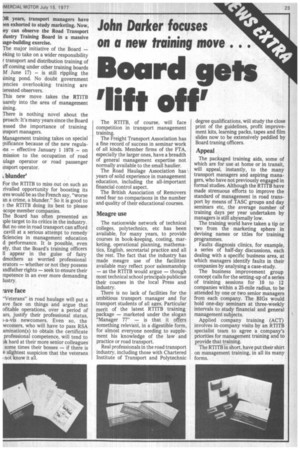John Darker focuses on a new training move . .
Page 25

If you've noticed an error in this article please click here to report it so we can fix it.
ward gets lift off'
DR years, transport managers have ?en exhorted to study marketing. Now, tey can observe the Road Transport dustry Training Board in a massive kage-building exercise.
The major initiative of the Board — eking to take on a wider responsibility r transport and distribution training of 3.ff coming under other training boards M June 17) — is still rippling the lining pond. No doubt government ;encies overlooking training are terested observers.
This new move takes the RTITB uarely into the area of management tining.
There is nothing novel about the ,proach: It's many years since the Board .essed the importance of training insport managers.
Management training takes on special ;nificance because of the new regula ns effective January 1 1978 — on mission to the occupation of road ulage operator or road passenger insport operator.
blunder'
For the RTITB to miss out on such an rivalled opportunity for boosting its ires would be as the French say, "worse an a crime, a blunder." So it is good to the RTITB doing its best to please scope member companies.
The Board has often presented an iple target to its critics in the industry. But no one in road transport can afford cavill at a serious attempt to remedy ficiencies in management education d performance. It is possible, even ely, that the Board's training officers 11 appear in the guise of fairy dmothers as worried professional erators — whether or not they possess mdfather rights — seek to ensure their mpetence in an ever more demanding lustry.
rave face
"Veterans" in road haulage will put a ave face on things and argue that ofitable operations, over a period of ars, justify their professional status, 3-a-vis newcomers. Even so, the wcomers, who will have to pass RSA amination(s) to obtain the certificate professional competence, will tend to 3k hard at their more senior colleagues some times their bosses — if there is e slightest suspicion that the veterans not know it all. The RTITB, of course, will face competition in transport management training.
The Freight Transport Association has a fine record of success in seminar work of all kinds. Member firms of the FTA, especially the larger ones, have a breadth of general management expertise not normally available to the small haulier.
The Road Haulage Association has years of solid experience in management education, including the all-important financial control aspect.
The British Association of Removers need fear no comparisons in the number and quality of their educational courses.
Meagre use
The nationwide network of technical colleges, polytechnics, etc has been available, for many years, to provide courses in book-keeping, costing, marketing, operational planning, mathematics, English, secretarial practice and all the rest. The fact that the industry has made meagre use of the facilities available may reflect poor salesmanship — as the RTITB would argue — though most technical school principals publicise their courses in the local Press and industry.
There is no lack of facilities for the ambitious transport manager and for transport students of all ages. Particular merit of the latest RTITB training package — marketed under the slogan "Manager 77" — is that it offers . something relevant, in a digestible form, for almost everyone needing to supplement his knowledge of the law and practice or road transport.
Real professionals in the road transport industry, including those with Chartered Institute of Transport and Polytechnic degree qualifications, will study the close print of the guidelines, profit improvement kits, learning packs, tapes and film slides now to be extensively peddled by Board traning officers.
Appeal
The packaged training aids, some of which are for use at home or in transit, will appeal, instantly, to the many transport managers and aspiring managers, who have not previously engaged in formal studies. Although the RTITB have made strenuous efforts to improve the standard of management in road transport by means of TASC groups and day seminars etc, the average number of training days per year undertaken by managers is still abysmally low.
The training world have taken a tip or two from the marketing sphere in devising names or titles for training programmes.
Faults diagnosis clinics, for example, a series of half-day discussions, each dealing with a specific business area, at which managers identify faults in their companies by analysing a case-study.
The business improvement group concept calls for the setting-up of a series of training sessions for 10 to 12 companies within a 25-mile radius, to be attended by one or two senior managers from each company. The BIGs would hold one-day seminars at three-weekly intervals to study financial and general management subjects.
Applied company training (ACT) involves in-company visits by an RTITB specialist team to agree a company's priorities for management training and to provide that training.
The RTITB in short, have put their shirt on management training, in all its many forms.




























































































